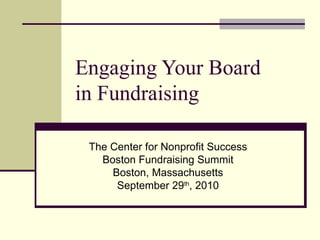Engaging The Board In Fundraising
- 1. Engaging Your Board in Fundraising The Center for Nonprofit Success Boston Fundraising Summit Boston, Massachusetts September 29 th , 2010
- 2. Workshop Facilitators Clare McCully, Vice President of Development Newbury College Terry O`Connor, Exec Director Cardinal Shehan Center Sondra Lintelmann-Dellaripa, Principal Harvest Development Group
- 3. Syllabus One Framing your Perspective Partnership What’s the point of having board involved? Reasons Board Members resist The Mirror The Pillars Defining Roles
- 4. Syllabus Two Planning and Measuring Policy on Board Fundraising Strategic Planning and engagement Measurement tools
- 5. Syllabus Three Training and Communication Access Authority Formal Informal Q&A: 15 minutes
- 6. Framing Your Perspective Partnership What’s the point of having board involved? Reasons Board Members resist The Mirror The Pillars Defining Roles
- 7. Partner OR Benevolent Dictator How do you see your Board ?
- 8. What’s the Point? Responsibility, On Stage, Enlarge Network Board role in Philanthropy Board role is to govern and act as fiduciary authority for the protection of the organization and its stakeholders. Impactful reason Change the view Not about asking for money Is about making a meaningful and tangible impact Trustworthiness important to Passion Work for us Work for you Passion=Philanthropy The rest comes naturally- that’s fundraising.
- 9. Reasons Board members don't fundraise No education Too overwhelming Too embarrassing (no skill) Not aware what they were signing up for No money themselves Fear of rejection Or fear that they are asking too much of someone, something the other can't part with. Lack of confidence in plan, process, person, organization Disinterested
- 10. Most board issues are not about the board, but about us. Lack of concrete goals, lack of clarity in board roles, hazy expected objectives/outcomes, poor organization of donors, poor research, lack of effective communication of organizational success…….
- 11. Preparing for success THOUGHTFUL BOARD DEVELOPMENT Thoughtful and Strategic Board Development creates valuable board fundraising partners Known GAPS and NEEDS Clear expectations Specific Agreement Ongoing Structure CHAMPIONS
- 12. Defining Roles Board Role Be actively engaged Identify VIP’s Open Doors Build friends Advocacy High level asks Social Oppy’s Thank you Staff Role Set direction Oversee operations Maintain contact with donors Direct solicitation process Develop opportunities for engagement Provide resources
- 13. Planning and Measuring Policy on Board Fundraising Strategic Planning and Engagement Measurement Tools
- 14. Policy on Board Fundraising Good policy: Sets expectations Frames work Supports objectives Provides direction Builds confidence Ensures general satisfaction Establishes continuity
- 15. Strategic Planning and Engagement * What is the right balance of restricted vs. unrestricted income? * Should you build an endowment and if so, how quickly? * How will your organization stay competitive and relevant to funders? * How dependent should you be on any single source of funding? * How much risk are you willing to accept? * How much growth would investment in different revenue strategies produce? * What is the role of membership in your revenue generating strategy? * What role does fee-for-service income play in your organization? * What kind of investment is necessary to achieve these objectives? Over what timeline? * What is the obligation of the Board in revenue generation? * How will the Board effectively monitor fundraising success?
- 16. Measurement Tools "Technological man can't believe in anything that can't be measured, taped, or put into a computer." ~Clare Booth Luce Measure progress, not completion of goal Define success in terms other than financial Establish credible Benchmarks/Metric Define accountability Agree on Plan B Review monthly
- 17. Training and Communication Access and Authority Formal and Informal
- 18. Access and Authority Access to staff Access to data and details on organizations fiscal responsibility, program outcomes and on philanthropic results Access to information and research on donors Authorized voice in the planning process Authorized to partner with program and development officers Authorized to speak/advocate on behalf of the organization
- 19. Formal and Informal Training Specific training on philanthropy: donor cycle, translational relationships Modeling behaviors Mentoring Inclusion in organizational annual training activity Communication Formal data reports Formal program reports (stories) Congenial informal relationships encouraged with all staff Success broadcast
- 20. Questions
Editor's Notes
- #15: SAMPLE POLICY HANDOUT?




















